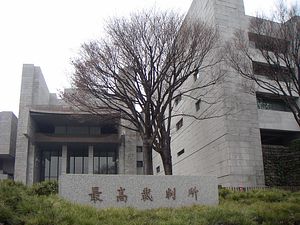Japan’s Supreme Court made a controversial and potentially damaging ruling concerning the country’s long-term foreign population last Friday. The Second Petty Bench of the Supreme Court ruled that foreigners in Japan with permanent residency status are not guaranteed to receive social welfare benefits under existing law. This would be the first time Japan’s highest court has ruled against foreigners receiving welfare under the current legislation. While it will still be up to the discretion of local and municipal government’s as to whether these residents receive benefits, this ruling sets a very serious precedent for Japan’s long-term and permanent foreign residents. Without the ability to access this social safety net, an already vulnerable portion of the population could become further marginalized, possibly posing a risk to social stability that Japan is ultimately seeking to avoid.
The Supreme Court ruled that only “citizens” have the right to public assistance, and that foreign residents do not meet the legal definition of that term. The court further said that, “Foreigners do not possess the right to receive assistance based on the law and are only limited to being subjects for public assistance in a practical sense based on administrative decisions.” The case before the court was brought by an 82-year-old woman Chinese woman who was born and grew up in Japan. Her initial application for assistance was declined by the Oita municipal government in 2008, which claimed the woman had sufficient savings to survive without welfare. The case was then appealed to the Fukuoka High Court and overturned, which stated that foreigners were entitled to public social welfare programs under the Public Assistance Law. The Supreme Court then overturned the Fukuoka court’s decision. Despite Japan’s highest court’s ruling, Oita public officials have said that the ruling would not affect their current policy of providing assistance to permanent foreign residents, “including the plaintiff.”
Herein lies the difficulty with the Supreme Court’s ruling. According to Japanese law, this type of assistance is only available to Japanese nationals. However, in 1954 the government issued a notice stating that foreigners should be dealt with in accordance with the public assistance law, which the Fukuoka court referenced. The Public Assistance Act makes no mention of providing assistance based on nationality, but only seeks to “guarantee a minimum standard of living as well as to promote self-support for all citizens who are living in poverty by providing the necessary public assistance according to the level of poverty, based on the principles prescribed in Article 25 of the Constitution of Japan.” Article 25 of the Constitution also does not address nationality, but says “all people shall have the right to maintain the minimum standards of… living. [T]he State shall use its endeavors for the promotion and extension of social welfare and security…” The Supreme Court ruling seems to rest on its interpretation both of the Constitution, and of the term “citizen” in the Public Assistance Act.
The ruling poses a problem for the government. It is in the awkward and unwelcome position of levying a specific tax on a portion of the population that cannot claim legal recourse to funds raised by the tax. Not only will this be viewed unfavorably by Japan’s foreign population, it is highly likely to met with skepticism by the international community as to the real intent behind the ruling. While Japan’s foreign population is relatively small (estimated at just 2.5 million in a country of 127.6 million in 2012) and the international outcry will in all likelihood not be great enough to cause Japan to reconsider the ruling, there will be larger problems created by the verdict.
This case is reflective of the state of Japan’s social welfare system. As its population ages and eventually declines, the pressure on the government to provide its promised assistance will be stretched to its limit, and without significant reforms this generous regime of social safety nets could fall apart. The Supreme Court is well aware of this. The problem lies in the fact that Prime Minister Shinzo Abe’s latest round of structural economic reforms is intended to attract both high-skilled white collar foreigners as well as those in the fields of construction and health care. Some of his immigration reforms are targeted at foreigners looking to become long-term or permanent residents. With immigration reform in general viewed as the only realistic way to prevent significant population (and thus economic) decline for Japan, the effect this ruling will have on both the existing and future foreign population seems not to have been taken into account. Long-term foreigners will be less inclined to continue their residence if the generous social welfare system, which they pay into just like Japanese nationals, is withheld from them in order to maintain a safety net past its ability to sustain itself.

































